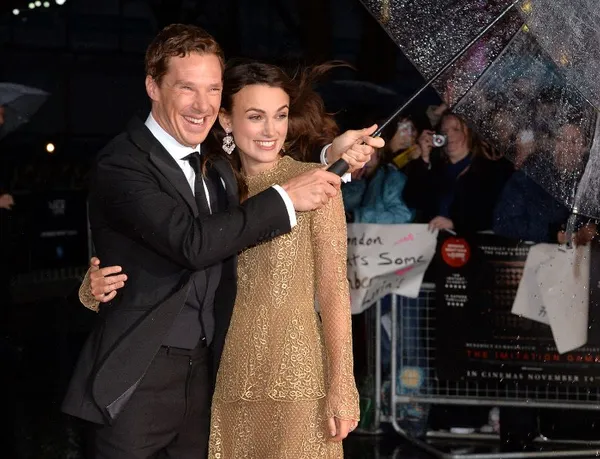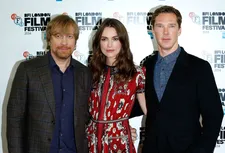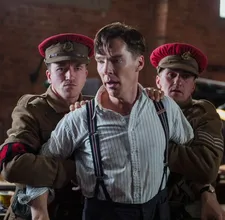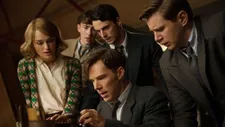 |
| Benedict Cumberbatch and Keira Knightley smile through the rain on the red carpet at The Imitation Game's gala opening of London Film Festival Photo: Anthony Harvey/2014 Getty Images |
Cumberbatch was on good form during the Q&A for the film, despite fielding inevitable questions about his penchant for playing eccentric geniuses following his acclaimed role as the BBC’s current Sherlock Holmes, and was eager to discuss Turing’s legacy which was buried for years due to official secrecy. He was also keen to stress the disgraceful treatment Turing received at the hands of the authorities once his sexuality became known in the early 1950s: the Professor ultimately committed suicide after being convicted of indecency and forced to undergo chemical treatment for his “condition”.
 |
| Morten Tyldum, Keira Knightley and Benedict Cumberbatch before the London Film Festival Gala Photo: Tim P. Whitby/2014 Getty Images |
BC: The idea of getting broader story, a broader picture of him out there to a wider audience is obviously something that does bear a certain weight and importance. It is his legacy; this has been an extraordinary decade for him: because of the pardons, because of the new books, because of the centenary, and now this film. It's all part of the momentum of what I hope is the recognition he deserves - as a scientist, as the father of the modern computer age, and as a war hero. A man who lived an uncompromising life at a time of disgusting discrimination.
This film is also an examination of something that was not well documented. Physically there is no medium of him: there are, ironically given what he was studying, no audio or visual recordings of him. So yes, it is a huge weight, but it is a blank canvas to an extent, and therefore there is a bit of freedom. But you are toying with something that you have nothing to bounce off with as a reflection. So I worked with Graham’s [screenwriter Graham Moore] brilliant script, and especially Morten’s [director Morten Tyldum] research and what he guided me towards, along with people who had met him or related to him. No matter how long ago it had been in their lives, they gave me accounts that were helpful to personalise this extraordinary man who’s achievements were becoming known in broad headline terms, but were more specific about who is was moment to moment in our story.
On Oscar Buzz:
BC: If it gets people to see the film, frankly that is all I care about. It is flattering, of course. But if it creates an interest to see this film and see what the fuss is about, fantastic. It means our jobs as storytellers are made easier if there is an audience for our storytelling. And more importantly for me, having had some experience with this extraordinary man I really want his story to be known as broadly as possible, and our film to be a launching point for more interest and understanding of him, and a proper celebration of him too. From that point of view, its good.
 |
| Benedict Cumberbatch on Alan Turing: It's all part of the momentum of what I hope is the recognition he deserves |
BC: I thought it was a very cool, intelligent and smart fit to bring a man who had brought an incredibly entertaining but dark thriller to our attention a few years ago [Headhunters]. He proved his brilliance with that. The minute I met him I realised how astute he was - and this was borne out with Headhunters - with character studies. You can't be invested in a thriller unless you care about the characters. So we talked and got on really well, and we both shared a passion for the subject having engaged with the script and both discovering more about this man than we knew before, and being ashamed of that. I felt the same as Morten: “Why isn't this man on the face of some denomination of our currency? Or the covers of science and history textbooks?”
I was thrilled day by day. He’s got an extraordinary energy. He was very specific in his direction, very highly attuned to the all the turns and twists and immediate circumstances and where we were in the story, and contextualising the moment. You need that when you are telling an important story, you need as strong director, not just with energy, but intelligence. And we got him. I knew from the first meeting it was going to be a riot to work with him.
On playing socially abrasive heroic geniuses:
BC: I didn’t read the script and think, this is Sherlock in tweed. I liked the wit of it, and I liked how uncompromising Turing was, and I suppose that is a strong strait, and strong traits always have an attraction for actors of every variety. I have played stupid people as well, I’d like to point that out, and if anyone has any more stupid character roles, bring them on. It’s a great honour to be asked to play someone like Alan Turing, so the last thing I’m going to do is go: “Well, it’s a bit like Sherlock isn't it?”. Because it’s not, it’s really not. And you cannot begin to fathom who an individual is if you just start categorising them according to similarities to other characters you've played. I do try to shake it up, but I also do see why people might think that these two very clever people might have similarities.
On why it took so long for Alan Turing to be acknowledged:
 |
| The Imitation Game |
This is a film where we touch upon those issues, and it is a thrilling story and it is funny. It is a film. But I beg anyone who is at all interested from what we present of him to look further into his life, to look further into Bletchley Park and the biographies that have been written about him. And the other characters from the film, like Joan and Hugh and Ken Cross. Fascinating characters who played the part of being quiet, stoic heroes, along with thousands of other men and women who remain nameless, some of whom still keep their secrets even when they don't have to. We celebrate them too. So that might be part of it: if we as a society have lived through a very secretive era, we are very good as overlooking things. But I think its dangerous to do that, as the smell from underneath the floorboards will eventually become impossible to ignore.
On how much of the maths he understood:
BC: There is a great, broad romance to the philosophy of maths and physics, which is tangible, because otherwise there is no point explaining it or sharing it with an audience. I think there are hugely exciting things that on a base level anyone can understand: ideas of programming, coding, the idea that what we use at language can be turned into something universal that can be used anywhere. Those things excite me, the fact that my eyelash contains carbon from a star excites me. I don't necessarily understand everything about how to make an eyelash, but the broad brushstrokes are very appealing. As far as the machine is concerned - the “Bombe”, or “Christopher” in our film, that was the moment where I started thinking, “Ok, this is pretty hard.” I understood a little bit about the Enigma machine, but yeah, if you put an algorithm in front of me now, even a quadratic equation, this press conference would go on too long.
The Imitation Game is playing at London Film Festival 2014 and is released across the UK on November 14 and in the US on November 21.





















